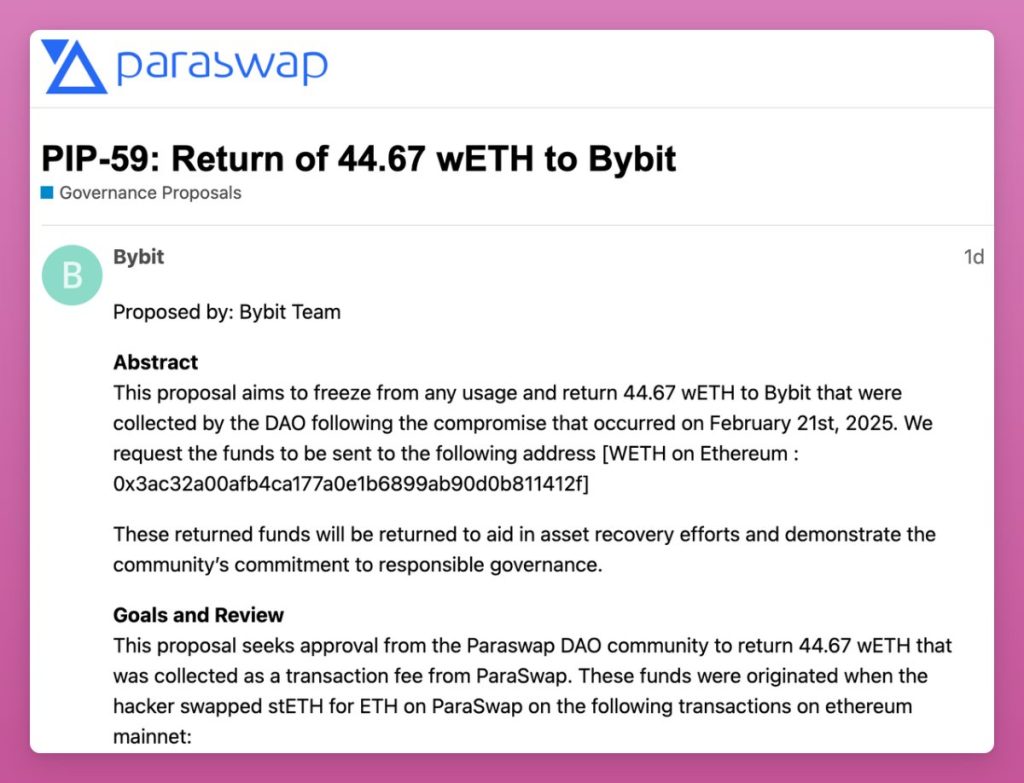Bybit Seeks Refund from ParaSwap DAO After Hacker Pays Over $90,000 in Fees
Key Points:
- Bybit seeks a refund of 44.67 ETH in swap fees from ParaSwap DAO paid by a hacker, sparking a governance debate on ethical and legal implications in the DeFi.
- Hackers converted $1 billion of the stolen $1.46 billion into Bitcoin, spreading it across thousands of wallets, with THORChain and other platforms facilitating the transfers.

Cryptocurrency exchange Bybit has requested a refund from ParaSwap DAO for swap fees paid by a hacker during a massive cyber theft, igniting a governance debate within the decentralized finance (DeFi) sector.
The request involves 44.67 ETH, valued at over $90,000, linked to a $1.46 billion exploit, prompting discussions about legal responsibility and the potential impact on the DeFi ecosystem.
Bybit’s Refund Request from ParaSwap DAO Sparks DeFi Governance Debate
The request was disclosed by DeFi analyst Ignas, a delegate within the ParaSwap DAO, who highlighted the ethical and legal implications of returning the funds.

While acknowledging that Bybit is a significant industry player, Ignas warned that compliance with the request could establish a precedent for future cases. He noted that the DAO legitimately earned the fees via smart contracts, and reversing the transaction could lead to unforeseen consequences.
Bybit CEO Ben Zhou recently revealed that nearly 20% of the stolen funds are now untraceable. The hackers, linked to North Korea, executed a sophisticated cyberattack that siphoned over $1.4 billion from the exchange.
The stolen funds were primarily converted to Bitcoin, with approximately $1 billion—equivalent to 417,348 ETH—dispersed across 6,954 cryptocurrency wallets. The distribution method, involving an average of 1.71 BTC per wallet, complicates tracking and potential recovery efforts.
According to blockchain analytics firm Elliptic, more than 11,000 wallets have been associated with the perpetrators.
Zhou also pointed out that the hackers utilized THORChain, a decentralized exchange, to launder ETH and BTC. Other platforms, including eXch and OKX Web3 Proxy, were reportedly used to transfer portions of the stolen assets.
As a result, THORChain’s transaction volume surged to over $5.8 billion within two weeks of the breach, with the platform earning roughly $5.5 million in associated fees.
Regulatory Concerns and Security Challenges Intensify
The incident has sparked criticism of THORChain, with blockchain security researcher Taylor Monahan arguing that its structure facilitates illicit financial activities. She asserted that the system operates within an isolated framework, benefiting insiders while enabling money laundering.
In response to mounting concerns, a THORChain developer known as “Pluto” announced they would cease contributions to the protocol after a vote to block transactions linked to North Korean hackers was reversed.
Meanwhile, the FBI has identified 51 cryptocurrency wallet addresses believed to be connected to the attack. Authorities anticipate that the hackers will continue attempting to convert the stolen funds into fiat currency, further complicating recovery efforts.
| DISCLAIMER: The information on this website is provided as general market commentary and does not constitute investment advice. We encourage you to do your own research before investing. |























